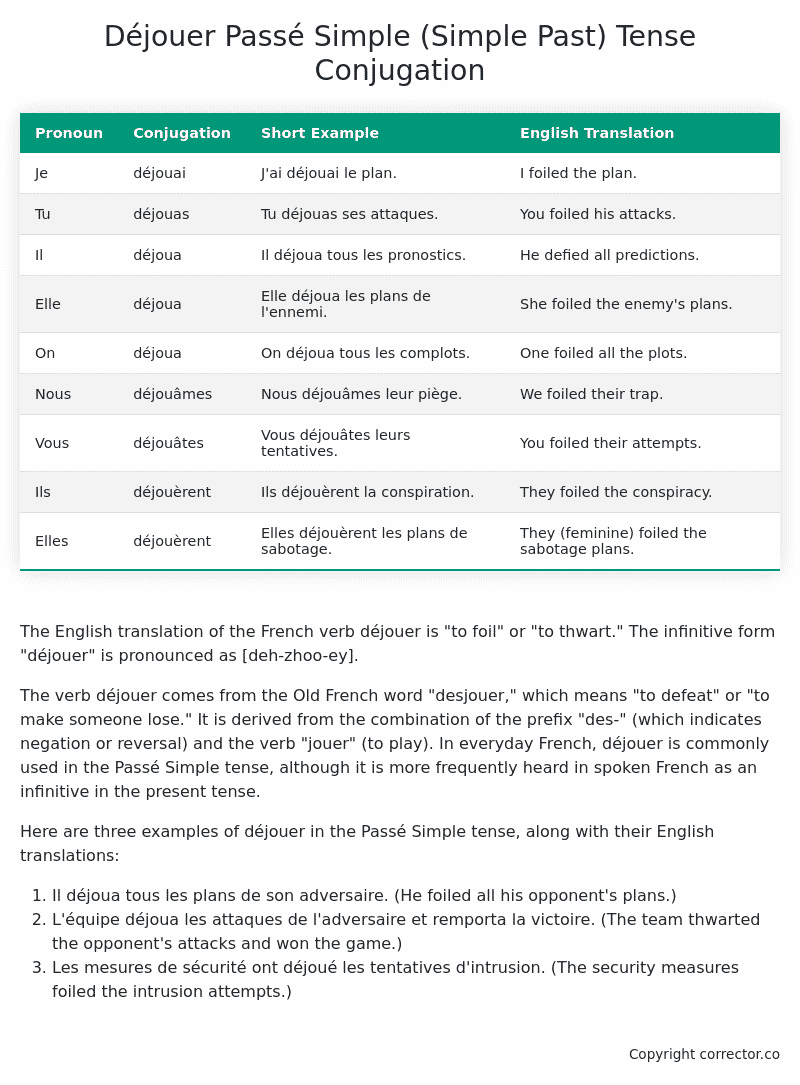Passé Simple (Simple Past) Tense Conjugation of the French Verb déjouer
Introduction to the verb déjouer
The English translation of the French verb déjouer is “to foil” or “to thwart.” The infinitive form “déjouer” is pronounced as [deh-zhoo-ey].
The verb déjouer comes from the Old French word “desjouer,” which means “to defeat” or “to make someone lose.” It is derived from the combination of the prefix “des-” (which indicates negation or reversal) and the verb “jouer” (to play). In everyday French, déjouer is commonly used in the Passé Simple tense, although it is more frequently heard in spoken French as an infinitive in the present tense.
Here are three examples of déjouer in the Passé Simple tense, along with their English translations:
- Il déjoua tous les plans de son adversaire. (He foiled all his opponent’s plans.)
- L’équipe déjoua les attaques de l’adversaire et remporta la victoire. (The team thwarted the opponent’s attacks and won the game.)
- Les mesures de sécurité ont déjoué les tentatives d’intrusion. (The security measures foiled the intrusion attempts.)
Table of the Passé Simple (Simple Past) Tense Conjugation of déjouer
| Pronoun | Conjugation | Short Example | English Translation |
|---|---|---|---|
| Je | déjouai | J’ai déjouai le plan. | I foiled the plan. |
| Tu | déjouas | Tu déjouas ses attaques. | You foiled his attacks. |
| Il | déjoua | Il déjoua tous les pronostics. | He defied all predictions. |
| Elle | déjoua | Elle déjoua les plans de l’ennemi. | She foiled the enemy’s plans. |
| On | déjoua | On déjoua tous les complots. | One foiled all the plots. |
| Nous | déjouâmes | Nous déjouâmes leur piège. | We foiled their trap. |
| Vous | déjouâtes | Vous déjouâtes leurs tentatives. | You foiled their attempts. |
| Ils | déjouèrent | Ils déjouèrent la conspiration. | They foiled the conspiracy. |
| Elles | déjouèrent | Elles déjouèrent les plans de sabotage. | They (feminine) foiled the sabotage plans. |
Other Conjugations for Déjouer.
Le Present (Present Tense) Conjugation of the French Verb déjouer
Imparfait (Imperfect) Tense Conjugation of the French Verb déjouer
Passé Simple (Simple Past) Tense Conjugation of the French Verb déjouer (You’re reading it right now!)
Passé Composé (Present Perfect) Tense Conjugation of the French Verb déjouer
Futur Simple (Simple Future) Tense Conjugation of the French Verb déjouer
Futur Proche (Near Future) Tense Conjugation of the French Verb déjouer
Plus-que-parfait (Pluperfect) Tense Conjugation of the French Verb déjouer
Passé Antérieur (Past Anterior) Tense Conjugation of the French Verb déjouer
Futur Antérieur (Future Anterior) Tense Conjugation of the French Verb déjouer
Subjonctif Présent (Subjunctive Present) Tense Conjugation of the French Verb déjouer
Subjonctif Passé (Subjunctive Past) Tense Conjugation of the French Verb déjouer
Subjonctif Imparfait (Subjunctive Imperfect) Tense Conjugation of the French Verb déjouer
Subjonctif Plus-que-parfait (Subjunctive Pluperfect) Tense Conjugation of the French Verb déjouer
Conditionnel Présent (Conditional Present) Tense Conjugation of the French Verb déjouer
Conditionnel Passé (Conditional Past) Tense Conjugation of the French Verb déjouer
Conditionnel Passé II (Conditional Past II) Tense Conjugation of the French Verb déjouer
L’impératif Présent (Imperative Present) Tense Conjugation of the French Verb déjouer
L’impératif Passé (Imperative Past) Tense Conjugation of the French Verb déjouer
L’infinitif Présent (Infinitive Present) Tense Conjugation of the French Verb déjouer
L’infinitif Passé (Infinitive Past) Tense Conjugation of the French Verb déjouer
Le Participe Présent (Present Participle) Tense Conjugation of the French Verb déjouer
Le Participe Passé (Past Participle) Tense Conjugation of the French Verb déjouer
Struggling with French verbs or the language in general? Why not use our free French Grammar Checker – no registration required!
Get a FREE Download Study Sheet of this Conjugation 🔥
Simply right click the image below, click “save image” and get your free reference for the déjouer Passé Simple tense conjugation!

Déjouer – About the French Passé Simple (Simple Past) Tense
Formation
Usage
Narration
Historical Context
Interactions with other tenses
Passé Composé
Imparfait
Conditional and Subjunctive
Summary
I hope you enjoyed this article on the verb déjouer. Still in a learning mood? Check out another TOTALLY random French verb conjugation!


